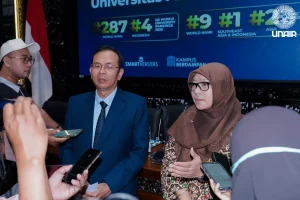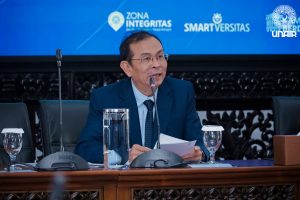UNAIR NEWS – Earning a scholarship to study abroad is a dream for many. Shintia Yunita Arini, S.KM., M.K.KK, a lecturer at Universitas Airlangga’s Faculty of Public Health, successfully achieved that dream. She is now pursuing a PhD at the University of Queensland, Australia, under the prestigious Australia Awards Scholarship (AAS). According to her, securing such a scholarship requires rigorous preparation.
She emphasized that applicants must go through several stages, including essay writing, CV drafting, and a final interview. Now based in Australia, Arini offered several practical tips that prospective applicants can use when applying for the scholarship.
Essay writing tips
Arini noted that one of the most common mistakes Indonesian applicants make is writing essays that are overly complicated. Many applicants, she said, tend to write broadly and fail to highlight the main points.
“A lot of people don’t get straight to the point. I understand there’s a lot you want to show, but that’s what the CV is for—not the essay. In the essay, just answer the question directly,” she advised.
She cited the question about choosing a university as an example. Many applicants, she noted, provide vague answers. She recommended conducting thorough research in order to provide specific, well-informed responses. “Take that question, for instance—look into what makes the university unique. What does it offer that can’t be found in Indonesia? That shows you’ve done your research,” she explained.
She also encouraged peer review prior to submission to gain more objective feedback. “We’re often not objective when reviewing our own work, so it’s important to have someone else take a look—whether that’s a peer, mentor, or former awardee willing to help,” she added.
CV writing tips
In addition to the essay, Arini emphasized the importance of writing a strong CV. She advised including detailed information about work experience, research involvement, volunteer activities, and awards. Applicants, she said, should not hesitate to showcase their achievements.
“For a scholarship CV, it’s okay to highlight your accomplishments—in a good way. Be thorough and confident,” she said.
She also reminded applicants to update their LinkedIn profiles, as scholarship reviewers may cross-check information online. In her own experience, her LinkedIn profile was reviewed during the AAS selection process.
“They often verify what’s on your CV through LinkedIn, so make sure it’s accurate. No one wants to risk lying on LinkedIn,” she noted.
Interview preparation tips
Regarding the interview, Arini stated that questions are typically based on the content of your essay and CV. Therefore, it’s critical that those documents are accurate and thoughtfully written.
“If your answers in the interview don’t align with what you wrote, they’ll notice—and they’ll ask follow-up questions,” she explained.
She also highlighted the importance of demonstrating openness and inclusivity—especially for international scholarships—since global academic environments place a high value on diversity and adaptability.
“They’ll be able to tell if you’re an adaptable person based on how you respond. So start getting comfortable with differences now,” she concluded.
Author: Septy Dwi Bahari Putri
Editor: Khefti Al Mawalia









